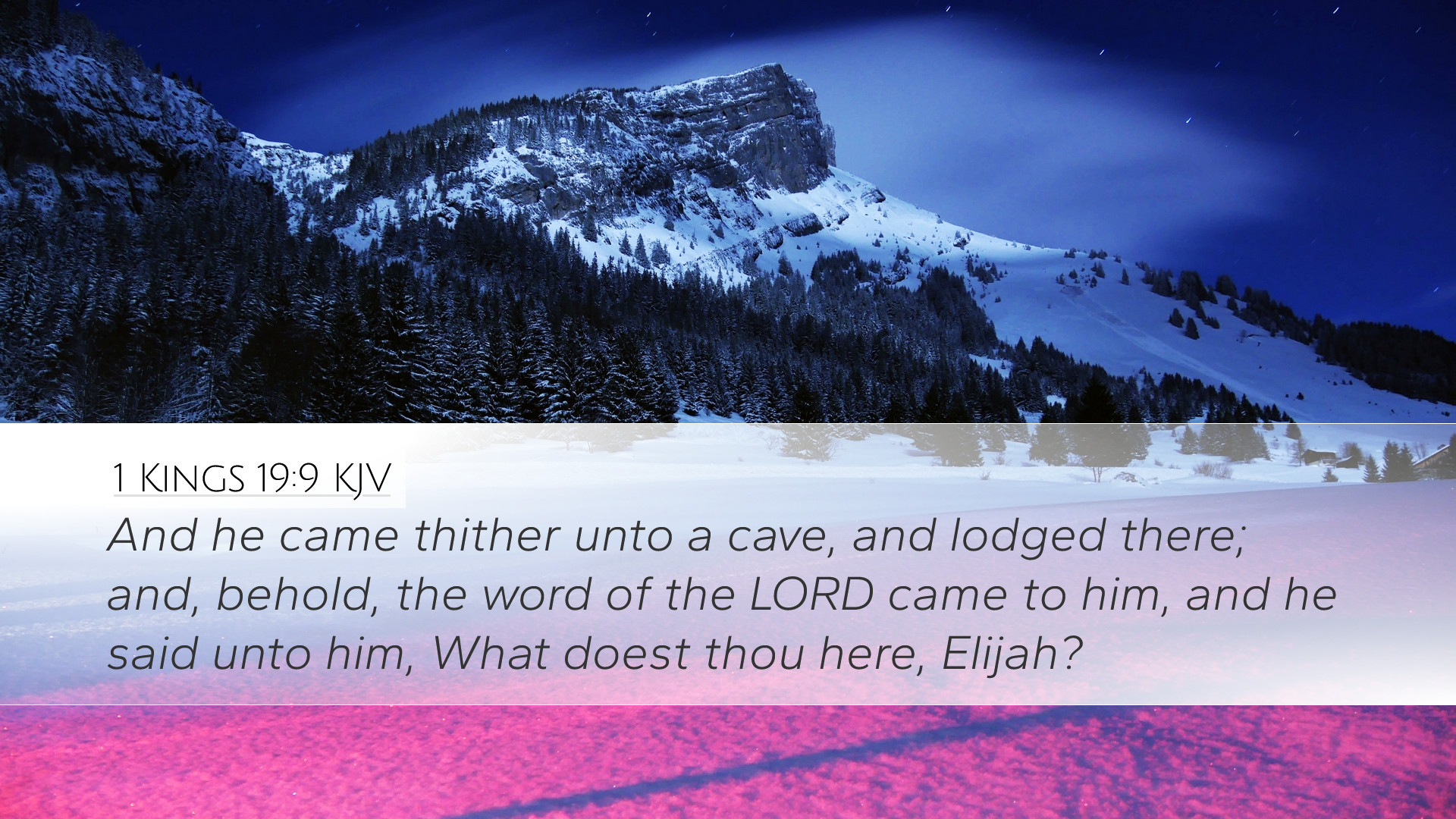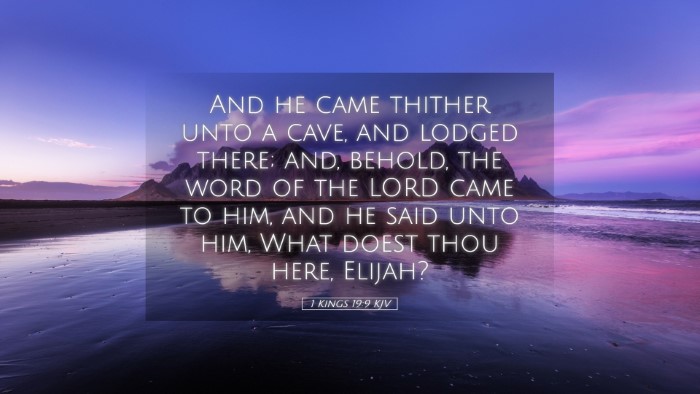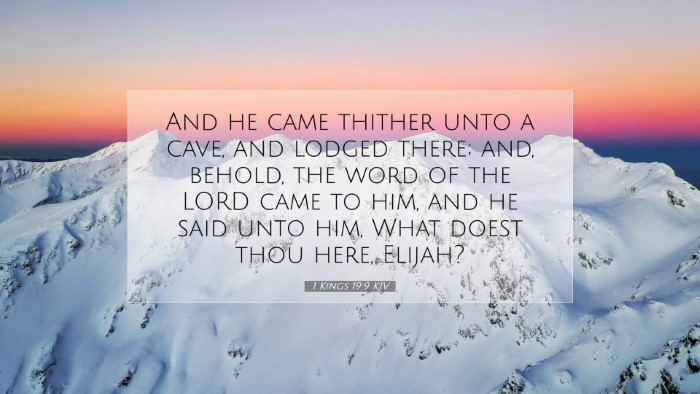Old Testament
Genesis Exodus Leviticus Numbers Deuteronomy Joshua Judges Ruth 1 Samuel 2 Samuel 1 Kings 2 Kings 1 Chronicles 2 Chronicles Ezra Nehemiah Esther Job Psalms Proverbs Ecclesiastes Song of Solomon Isaiah Jeremiah Lamentations Ezekiel Daniel Hosea Joel Amos Obadiah Jonah Micah Nahum Habakkuk Zephaniah Haggai Zechariah Malachi1 Kings 19:9
1 Kings 19:9 KJV
And he came thither unto a cave, and lodged there; and, behold, the word of the LORD came to him, and he said unto him, What doest thou here, Elijah?
1 Kings 19:9 Bible Commentary
Commentary on 1 Kings 19:9
1 Kings 19:9 reads: "And he came thither unto a cave, and lodged there; and, behold, the word of the Lord came to him, and he said unto him, What doest thou here, Elijah?"
Contextual Analysis
This verse occurs in a narrative that follows one of the most significant confrontations in the history of Israel, where the prophet Elijah challenges the prophets of Baal on Mount Carmel (1 Kings 18). The events leading to this moment reveal Elijah's profound discouragement following Queen Jezebel’s threats against his life. It is crucial to understand that this narrative captures Elijah at a low point, reflective of his human frailty amid divine calling.
Insights from Matthew Henry
Matthew Henry emphasizes that Elijah's retreat to the cave represents not just a physical hiding but also a spiritual despondency. Henry writes that it is in our lowest moments that the Lord often seeks to bring us back to Himself. The question posed by God, “What doest thou here, Elijah?” serves to prompt self-reflection—that Elijah must consider his purpose and calling, despite his overwhelming circumstances.
Henry further points out that God’s inquiry was not merely for information; it was an invitation for Elijah to elucidate his feelings and motives. This dialogic approach allows Elijah to voice his fears and frustrations before the Lord, illustrating God’s compassion towards His prophets in their times of need.
Insights from Albert Barnes
Albert Barnes notes that the cave serves as a significant symbol of isolation and introspection. He notes that Elijah’s words, expressing a sense of abandonment, underscore the emotional turmoil faced by the prophet. Barnes elaborates that Elijah felt he was the only one left who remained faithful to God, failing to see the broader picture of God’s continued work among His people.
The Lord’s question acts as a catalyst for Elijah's self-examination. Barnes concludes that this interaction highlights the necessity of divine communication during times of trial. The Lord’s inquiry reveals God’s persistent engagement with His prophets, encouraging them to bring their burdens into the open.
Insights from Adam Clarke
Adam Clarke offers a theological reflection on the significance of the cave. He suggests that Elijah’s sheltering in a cave is symbolic of all believers’ tendencies to retreat in times of crisis. Clarke posits that the divine question ("What doest thou here?") speaks to a universal truth regarding purpose; it compels reflection on one’s role in the divine plan.
Clarke also highlights the responsive nature of Elijah's answer to God as an acknowledgment of fear and disillusionment, revealing Elijah's struggle with discouragement in the face of opposition. This exchange underscores a pivotal moment where God does not rebuke Elijah for his fear but rather seeks to draw him out of his isolation.
Theological Themes
- Divine Presence in Despair: The Lord’s question implies the seeker nature of God’s relationship with His servants. It signifies God's presence even in moments of despair.
- Self-Reflection and Divine Dialogue: The dialogue encourages believers to engage deeply with their motives and emotions, welcoming God's perspective on their circumstances.
- Isolation vs. Community: Elijah’s claim of being the last faithful prophet points to the tension between individual experience and the communal aspect of faith.
- God’s Compassionate Approach: The gentle inquiry reflects God's compassionate nature, as He desires His servants to articulate their struggles without fear of retribution.
Concluding Thoughts
1 Kings 19:9 captures a moment of profound significance in the life of Elijah as a prophet. The insights from public domain commentaries draw attention to the spiritual, emotional, and psychological layers wrapped in this single question from God. Pastors, students, theologians, and Bible scholars are encouraged to contemplate the implications of God’s inquiry in their personal contexts.
The verse illustrates that moments of retreat and despair can serve as critical junctures for renewal and purpose. It reminds us that questioning from God can lead us back to clarity and mission in our spiritual journeys.


